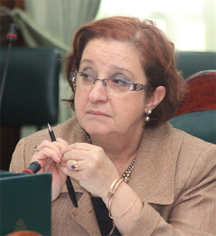While the Access to Information legislation has been enacted, a commencement order is needed to bring it into force and this cannot be done until a Commissioner of Information is appointed, presidential advisor on governance Gail Teixeira says.
The then Bharrat Jagdeo administration used its majority in the National Assembly to pass the controversial legislation on September 15, 2011, in the absence of the opposition parties.
When asked about the status of the legislation, Teixeira said it was assented to and gazetted some time in 2011.
While such legislation was called for over a long period of time, when the bill was tabled there was strong objection to its format, especially the provision for the Commissioner of Information to be selected by the President.
Although the bill was sent to select committee for review, it was returned to the National Assembly almost unchanged and was eventually pushed through by the government.
Teixeira, in a brief interview, told Stabroek News that there may be some issues with the appointment of the Commissioner of Information. “As you know, the opposition in those days was opposed to the whole idea of a Commissioner of Information,” she stated, when addressing the failure to make an appointment.

Asked if there was any progress in identifying a candidate, Teixeira said the way the bill was designed a number of things had to be put in place before this is done “and that we are trying to do.” But, she added, the last year has been difficult, dealing with the budget and other issues.
As to whether there have been any talks between the government and opposition on the issue, Teixeira said she was not aware of any discourse but pointed out that it did not require any; rather, it only requires identifying persons who would be willing to serve.
“We have not identified anyone… I can think about several persons. But it is not my decision to make,” she said, when asked if there are any potential candidates for the job.
“As it is right now we are awaiting,” she added, while noting that in the meantime a number of government websites, like that of the parliament, are being updated so that a lot of information would be made available. She said this was an issue addressed in previous discussions with the opposition, especially the AFC.
“You can’t ask for a document that is already publicly available and once that is done you don’t have to ask,” she stated. “So part of the bill is already being implemented and that is making available as much as we can…,” Teixeira said.
When the bill was first read in 2011 the opposition parties and several media houses, including Guyana Publications Inc (GPI), publishers of the Stabroek News, had raised several objections to parts of it.
In its submission to the select committee reviewing bill, GPI had noted that the method of appointment of the Commissioner of Information should be varied—that instead of the President selecting and appointing the commissioner, the leader of the government’s business in parliament and the opposition leader should concur on the best possible candidate.
Clause 5 of the bill says that “(1) The President shall appoint a Commissioner of Information who shall be a person of eminence in public life with wide knowledge and experience in law, science and technology, social service, management, journalism, mass media or administration and governance. (2) The Commissioner of Information shall be a clearing house for processing requests and shall discharge the functions assigned to him under this Act. (3) The Commissioner of Information shall be provided with requisite staffing and budgetary support in order to discharge his functions under this Act. (4) The Minister shall provide the Commissioner of Information with such officers and employees as may be necessary for the efficient discharge of the functions of the Commissioner under this Act, and the salaries and allowances payable to, and the other terms and conditions of service of, the officers and employees appointed for the purpose of this Act shall be such as may be determined by the Minister”.
During the run up to the 2011 elections, now main opposition APNU said it would have repealed the Access to Information and Broadcast laws if it was elected into government. Since gaining a one seat majority in the National Assembly, the combined opposition—which includes the AFC, and which was strongly opposed to the way the bill was worded—has not addressed it.
The legislation is intended to provide the setting of a practical regime of right to information for persons to secure access to information under the control of public authorities in order to promote transparency and accountability in the working of the government and public authorities.








